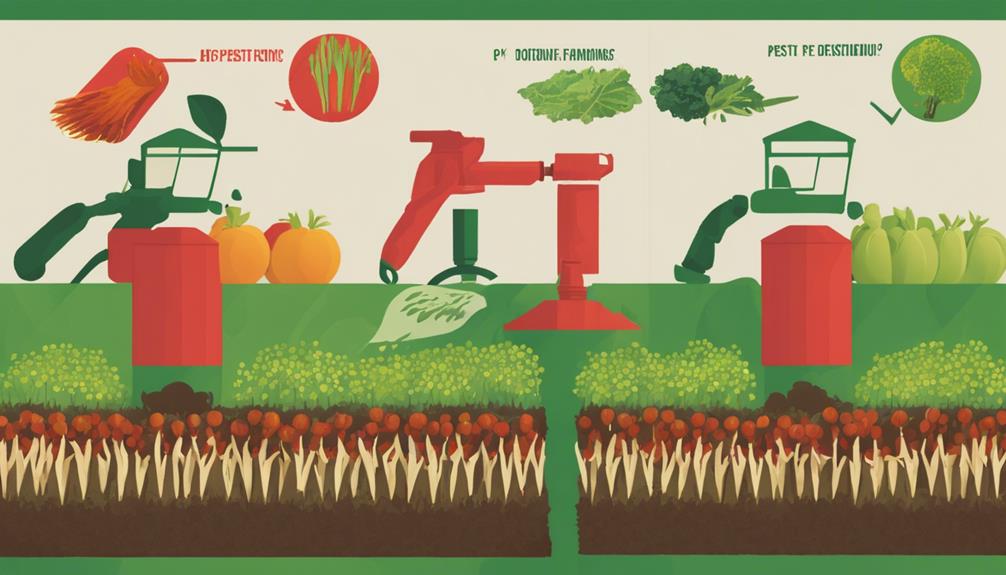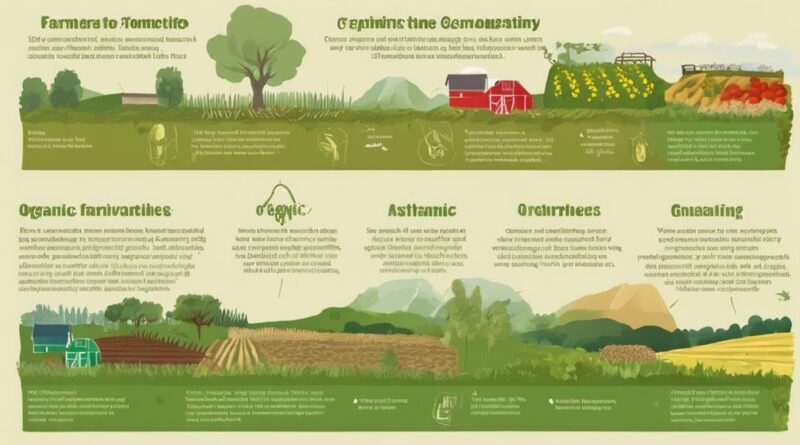What Is the Environmental Impact of Organic Food?
Organic food positively impacts the environment by enhancing soil health, conserving water, promoting biodiversity, reducing greenhouse gas emissions, supporting wildlife habitats, improving energy efficiency, minimizing pesticide use, and emphasizing sustainable waste management. These practices contribute to a healthier ecosystem and sustainable agriculture.
Soil Health Benefits
Have organic farming practices significantly enhanced soil health compared to conventional methods?
The answer lies in the core principles of organic farming, which focus on sustainability and improving soil fertility. Organic farming methods, such as crop rotation, cover cropping, and the use of organic fertilizers, have shown to improve soil structure and enhance nutrient levels. These practices promote the growth of beneficial soil organisms, which in turn contribute to better soil health. Studies have demonstrated that organic farming systems tend to have higher levels of organic matter, microbial activity, and overall soil health compared to conventional farming methods.
Improved fertility is a key aspect of sustainable agriculture, and organic farming excels in this area. By avoiding synthetic pesticides and fertilizers, organic farmers rely on natural methods to enhance soil fertility. For example, the use of compost and manure adds organic matter to the soil, improving its structure and nutrient content. This approach not only benefits the current crop yields but also has long-term positive effects on soil health.
Reduced Water Pollution
Reducing water pollution is a significant benefit associated with organic farming practices due to their minimal use of synthetic chemicals. Organic farming promotes water conservation by utilizing practices such as crop rotation and cover cropping, which help retain soil moisture and reduce the need for irrigation. The absence of synthetic fertilizers in organic farming also contributes to improved water quality by preventing nutrient runoff into water bodies.
Nutrient retention is a key aspect of organic farming that aids in reducing water pollution. Organic farmers often use natural fertilizers like compost and manure, which release nutrients slowly, allowing plants to absorb them more effectively. This approach minimizes nutrient leaching into water sources, thereby preserving aquatic ecosystems. In contrast, conventional farming methods, with their heavy reliance on synthetic fertilizers, pose a higher risk of nutrient runoff, which can lead to harmful algal blooms and oxygen-deprived dead zones in water bodies.
Biodiversity Conservation
Biodiversity preservation is a fundamental focus in organic farming practices due to their positive impact on ecosystem health and species diversity. Organic farming promotes habitat restoration and provides various ecosystem benefits. By avoiding synthetic pesticides and fertilizers, organic farmers create healthier soils that support diverse plant and animal species, contributing to overall ecosystem resilience.
Species protection is another crucial aspect of biodiversity conservation in organic farming. The absence of harmful chemicals in organic practices helps safeguard various organisms, from pollinators like bees to soil microbes essential for nutrient cycling. This protection of species leads to increased environmental sustainability as organic farms become havens for diverse wildlife.
Studies have shown that organic farming methods enhance biodiversity by supporting a greater abundance and diversity of plants, insects, birds, and other organisms compared to conventional farming. This increase in species richness not only benefits the farm itself but also has positive spillover effects on surrounding landscapes by promoting interconnected habitats and wildlife corridors.
Lower Greenhouse Gas Emissions
Organic farming practices significantly contribute to mitigating greenhouse gas emissions through sustainable cultivation methods. By focusing on natural processes and avoiding synthetic chemicals, organic farming helps reduce carbon footprint and combat climate change.
One key way organic farming achieves this is through the non-use of synthetic fertilizers, which are a significant source of nitrous oxide emissions, a potent greenhouse gas. Instead, organic farmers rely on compost, manure, and cover crops to nourish the soil naturally, thereby reducing greenhouse gas emissions associated with fertilizer production and application.
Additionally, organic farming promotes soil health and carbon sequestration. Healthy soils store more carbon dioxide, helping to offset greenhouse gas emissions. Practices such as crop rotation, mulching, and agroforestry utilized in organic farming enhance soil structure and microbial activity, further aiding in carbon storage.
Studies have shown that organic agriculture has the potential to reduce greenhouse gas emissions by up to 25% compared to conventional farming methods. This reduction in emissions plays a crucial role in mitigating climate change impacts. By choosing organic products, you're supporting a farming system that actively works towards lowering greenhouse gas emissions and fostering a more sustainable future for our planet.
Impact on Wildlife
The farming practices associated with organic agriculture can have both positive and negative impacts on wildlife populations. Organic farming typically promotes biodiversity by avoiding synthetic pesticides and fertilizers that can harm wildlife. By using natural methods to control pests and enhance soil health, organic farms can create healthier wildlife habitats within and around their fields. This can lead to an increase in the diversity of species present, supporting various forms of wildlife within the ecosystem.
However, the expansion of organic agriculture can also pose challenges to wildlife. Converting land for organic farming may result in the loss of natural habitats for certain species. Clearing land for organic crop cultivation can disrupt existing ecosystems, potentially displacing wildlife populations that rely on those habitats for their survival. It's crucial for organic farmers to implement practices that minimize habitat destruction and support ecosystem balance.
To mitigate the negative impacts on wildlife, organic farmers can implement strategies such as maintaining buffer zones around fields, preserving natural areas within farms, and practicing crop rotation to enhance biodiversity. By carefully managing their land and considering the needs of local wildlife, organic farmers can support wildlife habitats and contribute to overall ecosystem balance.
Energy Conservation
In terms of energy consumption, organic farming practices tend to exhibit lower levels compared to conventional agriculture methods. This difference arises from the emphasis on sustainable practices and the utilization of renewable resources in organic farming. Organic farms often prioritize energy conservation by relying on natural sources of energy such as solar power, wind power, and biofuels. These renewable resources play a crucial role in reducing the overall energy consumption associated with farming activities.
The use of renewable energy sources in organic farming contributes significantly to the conservation of energy. By harnessing solar energy through solar panels or using wind turbines to generate power, organic farms minimize their reliance on non-renewable energy sources like fossil fuels. This shift towards renewable resources not only reduces the environmental impact but also promotes long-term sustainability within the agricultural sector.
Furthermore, sustainable practices such as crop rotation, composting, and integrated pest management in organic farming help optimize energy efficiency. These methods enhance soil health, reduce the need for synthetic fertilizers and pesticides, and ultimately lower the energy inputs required for crop production. Overall, the focus on energy conservation in organic farming underscores its commitment to environmentally friendly and resource-efficient agricultural practices.
Pesticide Reduction

Implementing integrated pest management strategies enhances sustainability in farming practices by reducing reliance on chemical pesticides. This approach focuses on preventing pest issues through a combination of techniques such as biological control, habitat manipulation, and the use of resistant crop varieties. By minimizing the need for synthetic pesticides, organic farming promotes environmental health and biodiversity while also offering several benefits to human health and consumer perception.
- Health benefits: Organic foods are produced without synthetic pesticides, which may reduce the risk of pesticide exposure and associated health issues for farmers, consumers, and surrounding ecosystems.
- Reduced chemical residues: Organic products have lower levels of pesticide residues, contributing to a cleaner food supply and potentially decreasing health risks linked to pesticide consumption.
- Biodiversity preservation: By avoiding the use of chemical pesticides, organic farming supports diverse ecosystems, including beneficial insects and soil microorganisms crucial for crop health.
- Long-term sustainability: Integrated pest management fosters resilient agricultural systems that can adapt to environmental changes, ensuring the continued productivity of farmland.
- Improved consumer perception: The reduced reliance on chemical pesticides in organic farming aligns with consumer preferences for healthier, environmentally friendly food options, enhancing the perceived value of organic products.
Waste Management
Minimizing pesticide use in organic farming not only benefits environmental and human health but also extends to efficient waste management practices. Organic farms often implement composting practices to recycle organic waste materials like crop residues and animal manure. Composting not only reduces the amount of waste that would otherwise end up in landfills but also produces nutrient-rich soil amendments that can be used to enhance soil health and fertility.
In addition to composting, organic food production emphasizes the reduction of food waste. By promoting practices such as proper storage, handling, and distribution of produce, organic farms aim to minimize the amount of food that goes to waste throughout the supply chain. Furthermore, organic farms tend to use eco-friendly packaging materials, such as biodegradable containers or recyclable packaging, to reduce the environmental impact of packaging waste.
Conclusion
In conclusion, the environmental impact of organic food production is significant.
From improving soil health and reducing water pollution to conserving biodiversity and lowering greenhouse gas emissions, organic farming practices offer numerous benefits.
By reducing pesticide use, managing waste effectively, and conserving energy, organic food production contributes to a more sustainable and environmentally-friendly agricultural system.
Overall, choosing organic food can have a positive impact on our planet's health and well-being.
